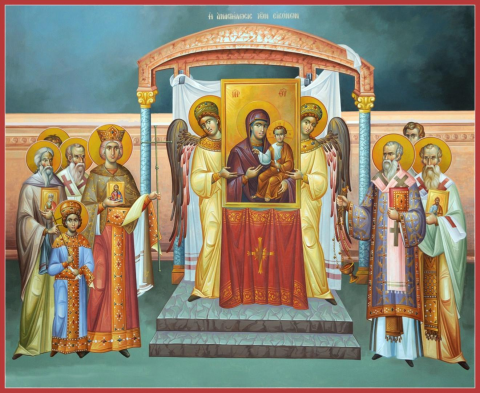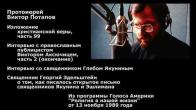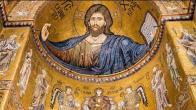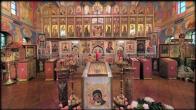You are here
WHEREIN LIES THE TRIUMPH OF ORTHODOXY?

Outwardly it may seem that evil triumphs in the world more often than not. Falsehood, violence, money, sectarianism, and atheism triumph. Some say that Orthodoxy was not victorious in history, that it did not justify itself. They cite facts and figures…
Yes, there truly is much evil in life. But the essence of life is not in that, but in that evil, not limited by any morality, for which there are no holds barred, for all its treachery, malice, and cynicism, is still unable to defeat the seemingly helpless, naïve, and meekly kind. We constantly see that there is good in life: selflessness, mutual help, friendship, mercy, love…
Why?
Because God exists, and He is always stronger than all evil put together. Orthodoxy bears witness to this.
The Triumph of Orthodoxy is a day that marks the main truth of what happens in life: The truth of God always triumphs, no matter how much evil rages.
Life tells us that it rarely happens that the majority are for truth. But it’s better to be with truth.
The Lord Himself tells us, Fear not little flock… I am with thee, and no man shall set on thee to hurt thee (Lk. 12:32, Acts 18:10).
He did not promise that His flock would be large. He did not command us to dream of that which will not be in reality, sighing despondently about it. He told us “Rejoice.” Rejoice that the gates of salvation exist. They, although narrow, are open for all who desire to enter in by them.
The Triumph of Orthodoxy is the Resurrection of Christ, for which we prepare ourselves by Great Lent and which we celebrate on the first Sunday of the Holy Quadragesima.
The Triumph of Orthodoxy is in that the Lord sent His disciples as lambs among wolves, and the wolves did not vanquish them, and they enlightened the entire universe.
The Triumph of Orthodoxy is in that the gates of Hell, as the Lord foretold, have not overcome the Church He created, although the powers of evil have sought for these past 2,000 years to destroy it. They still have not given up their insane hope for it. But the Church of Christ lives, and is even growing before our eyes. People pray, confess, commune, baptize their children, venerate its sacred objects, and are saved. It’s a great Triumph!
The Triumph of Orthodoxy is a miracle of the whole of Russian history, beginning with the Baptism of Rus’ 1,025 years ago and the Kulikovo victory on the day of the Nativity of the Most Holy Theotokos, until the great victory on Pascha in 1945, on the day of the Great Marty St. George the Victorious. The miracle of the Protection of the Queen of Heaven over our country, without which it simply wouldn’t exist anymore, was in answer to the faithfulness of our people to Orthodoxy. And even the time of godless persecution of the previous century became this triumph—for it revealed the host of the New Martyrs.
The Triumph of Orthodoxy is that which occurred before our eyes, before the eyes of people whose youths passed in Soviet, officially godless times. We, former Pioneers and Komsomol members, whose upbringing and education were wholly deprived of the truth of God, suddenly started approaching the Church, praying, and serving Him. We already can’t imagine our lives without Orthodoxy.
In those years, the Orthodox faith was considered something completely antiquated and obsolete. You couldn’t pronounce a single Orthodox word in any book, or on any television or radio program, or at any public event. The word “God” was to be written only with a lowercase letter. Thankfully, in the journalism department of Moscow State University, where I studied “scientific atheism,” they assigned us to read the Gospel at one point.
When I started going to St. Pimen’s Church on Novosloboskaya, there were only two of us permanent young parishioners. No one could imagine there would be even a step in the other direction, let alone such a miracle—the spiritual rebirth of the last quarter of a century; that in place of the Moscow pool, Christ the Savior Cathedral would stand again; that hundreds of monasteries would open, and thousands of churches; that young people could come to the Church, that children would commune, that there would be just as many men in church as women… We didn’t think anything of the sort could happen! And it surely couldn’t have happened by human power! But the Lord performed this miracle. A great Triumph!
The Lord heeded the prayers of the New Martyrs and received their sacrifice. He received all the sacrifices of our Orthodox people, their great patience, their faith, which not even the fierce persecutions which our people suffered could overcome.
Indeed, they worked pretty hard on our people… And they are continuing to work. Our people suffered great losses. These persecutions, alas, have not completely passed. But how hard they worked on us! As on no other people. They were deceived, and seduced, and frightened, and there was warfare against them, and they were shot for their faith—another people, after such total godless processing, after such casualties in general, would barely have remained alive on Earth. They did not have to work so hard with other peoples—they almost willingly renounced Christ and the life according to the Gospel, as if it was necessary, and even good. But our people, after all of this “work of Hell” (V. V. Mayakovsky), no matter how strange it may be, live, and their piety is different than in other lands. This is evidenced by the millions of our compatriots who have venerated Orthodox sacred objects in recent years.
The spiritual damage of the Catholic, Protestant, and Uniate West, which has departed from the pure Orthodox faith and gone to godlessness and Satanism also testifies to the truth of Orthodoxy.
It’s not without reason that the Triumph of Orthodoxy is celebrated at the end of the first week of Great Lent. The triumph of our faith and its truths, its aspiration for Heaven—the whole first week, filled with fervent prayers, prostrations, deep repentance, and above all in the reading of the Great Canon of St. Andrew of Crete, which all Orthodox people try to go attend in church, where it is read in the middle of the church by priests, bishops, and the patriarch himself. From the first day of Lent, we change our way of life and take upon ourselves a special spiritual labor—and we already see what good fruits this special, joyful, wise, and deep time of year brings. And that whole life which we usually live, “normal” life—how much emptiness and falsehood is in it, how earthly and fruitless it is, although it is customary. Even those labors which we take upon ourselves speak to us about what a great institution it is—the moment of truth, awakening, sobriety, and how much truth and purity there are in these days. A better name for them is the Triumph of Orthodoxy.
Every Orthodox person who prays and lives the Orthodox life well sees the Triumph of Orthodoxy in himself, in his life. He sees how the truth of our faith, the Church guidelines, the liturgical rhythm of life, with the support of the holy Sacraments of the Church gives him the strength of grace. For him, his faith is the most precious gift received from God and which gives the highest meaning to life.
Orthodoxy is the most real view of man, it is the triumph of the truth that our most important and hardest battle is with ourselves, with our sinfulness; that the rebuilding of our souls on the structure of the Gospel, and the acquisition of the Holy Spirit—the main goal of our earthly life—is achieved by labor, for a change of soul is impossible “apart from works,” as it says in the Great Canon.
This kind goeth not out but by prayer and fasting, our Savior revealed to us. The Triumph of Orthodoxy is the triumph of this truth. There is no Orthodoxy without fasting. Prayer, the services, and fasting yet remain practically in Orthodoxy only.
Every tree is known by its own fruit, the Lord said. The fruits of Orthodoxy are the hosts of saints in Heaven. They are the main Triumph of Orthodoxy. The saints whom we venerate in Orthodoxy, with whom we live, to whom we constantly turn in prayer, whose memories we celebrate as our feasts, whose names we bear are our Heavenly patrons, our quick helpers and intercessors for our souls. It was precisely fidelity to the Orthodox faith that made them saints. Precisely by this path the monastics, men of prayer, and hermits attained great spiritual gifts and holiness. We have the same means for our spiritual ascent to the heights of the spirit in our Church, at hand.
Therefore, in Holy Rus’ we fought wars for the faith, the tsar, and the fatherland—and above all for faith, as the greatest treasure of our lives, for it leads to Heaven; for the Orthodox tsar, because his main purpose is the protection of the faith, the Orthodox Church, and the people of God in their earthly lives.
The Triumph of Orthodoxy is the truth of the Divine establishment of Orthodox monarchy as the highest form of government, of the symphony of state and Church, in which a nation’s earthly affairs are governed by a man of faith, blessed by God for this service—a man of prayer, of confession, who tries to do His holy will, not yielding to his passions and the thoughts of the enemy, conscious that he will give an answer for his responsible service above all to the King of kings, from Whom he received his authority.
The Triumph of Orthodoxy is that love for icons without which an Orthodox person does not conceive of prayer, of speaking with God, with the Most-Pure Mother, with the saints, does not conceive of an Orthodox church, without which his home is as without a soul. He undoubtedly takes an icon with him on a trip and to the hospital. And when his earthly journey is over, they give him an icon in his hand—the transition into eternity is completely different with it.
The Triumph of Orthodoxy is the invincible victory of the Cross of Christ.
The Cross of the Lord is the key to understanding the mystery of life. The Cross is not a defeat, not the powerlessness of goodness, not the power of evil. The Cross is the greatest victory ever accomplished on Earth—the victory of love and humility, and of our faith, the Orthodox life.
“Russia is on Golgotha,” said Archpriest Nikolai Gurianov. All the suffering, sorrow, and seeming defeat of our people in history ares not so simple—it is their Golgotha, which they were accounted worthy of for their faithfulness to Christ, for their special acceptance of the “harsh bitterness of the Cross,” as one foreigner who once visited us correctly observed. We are not a slave people, but Christian; the cross and humility are not slavery, but the highest freedom.
The Triumph of Orthodoxy is the Russian character, which was brought up by our faith for centuries. It’s boring for a Russian to live only by earthly interests; he begins to drink from distress—poor man, weaned off of prayer and fasting. But when he has to take up a great common cause, to save someone, he feels at ease, and he knows then why he lives and is ready for labors.
The Triumph of Orthodoxy is our kindness and sincerity—“The spirit of Russian genuineness is the highest thing we have” (B. L. Pasternak). It is our great architecture and literature, music and painting, our beautiful songs; it is our great Russian language, which was always fed and enriched by Church Slavonic.
“Russia is on Golgotha, and America is no more,” said Batiushka Nikolai Gurianov.
There is no America, none of those who resist Holy Rus’, all of its crucifiers, its detractors, its slanderers—there is none of this in the true life. There is no life in all of this—only darkness. The unlife.
“How happy you are that you are believers!... That you are with the Lord!... That you have the truth!” Batiushka loved to repeat.
Orthodoxy, the true faith is the correct understanding of where is goodness and where is evil, where truth and where lies, including in our current sober, difficult days, when our country, as Hiero-Schemamonk Moses (Bogolyubov) said in 1992, is again “on the edge of the sword.”
Uniates and schismatics think that disinterested help is coming to them from the U.S. in the fight with “evil” (with or without quotation marks—it’s not important), but why do they need “friends” from across the ocean, and from the West in general?—ask. Is it really from an excess of goodness in relation to strangers so far away? Or maybe they need them just as a weapon in the first against Russia and Orthodoxy—for the dollar’s triumph over the world?
Batushka Nikolai foretold: “The devil is hurling his last weapon—money.” This is precisely what we are seeing today. This weapon is above all against Orthodoxy, for it most of all plagues the enemy of mankind.
The entire world-Sanhedrin has ganged up on Russia, and, as always, firstly because it is Orthodox. But they have never managed in history to defeat our Motherland—the Abode of the Most Holy Theotokos.
Every now and then people come to church and ask how to be and what to do. Their situations can indeed be very complex. The Triumph of Orthodoxy is in that we know that there are no hopeless situations with God. He Himself said all things are possible for the believer. “Every cloud has a silver lining,” our people say; everything according to the will of God. Whatever God does is for the best. God gives the day, God gives food. Keep away from sin. Everything works out with prayer and labor. Prayer and fasting are invincible weapons. And Batiushka Nikolai would say to those who sailed to him on the island, comforting them, “There are no difficult situations in life.” Or he would say, “Everything will be as you need.” Precisely! Because everything will be according to the will of God—as is best and most salvific for us. But you will not be saved without sorrows. We must through much tribulation enter into the Kingdom of God, the Lord told us. That means, glory to God for all things.
The enemy especially furiously attacks those who want to live according to the true faith—in the words of the apostle: Yea, and all that will live godly in Christ Jesus shall suffer persecution (1 Tim. 3:12). But the gracious help from above to the faithful is irresistible.
There is such an expression: If people only knew what joy there is for monastics, then everyone would want to be a monastic; and if they only knew what sorrows they have, no one would want to become one. To some extent, this can be said about the Orthodox. Our sorrows are earthly and temporal, but our joys are Heavenly; they begin here, but they depart into eternal joy.
Priest Nicholai Bulgakov
Translated by Jesse Dominick
2/25/2018
Relics in cathedral - monthly calendar
| S | M | T | W | T | F | S |
|---|---|---|---|---|---|---|
|
|
|
|
|
|
1
|
2
|
|
3
|
4
|
5
|
6
|
7
|
8
|
9
|
|
10
|
11
|
12
|
13
|
14
|
15
|
16
|
|
17
|
18
|
19
|
20
|
21
|
22
|
23
|
|
24
|
25
|
26
|
27
|
28
|
29
|
30
|
PARISH LIFE
Address of our Cathedral
While all the materials on this site are copyrighted, you may use them freely as long as you treat them
with respect and provide attribution on the Russian Orthodox Cathedral of St.John the Baptist of Washington DC.









